012版新目标英语七年级下册unit12_What_did_you_do_last_weekend_Section_A
人教新目标版七年级英语下册Unit12Whatdidyoudolastweekend(第1课时)教学设计

What did you do last weekend?
How was your weekend ?
1a
时间
8 m
5
读图,了解对话情景—地点和谈论的话题
T: First, look at the picture. Please watch and read.
Then, answer:
T:Who visited her grammar?
S: Emma did.
T: Where did Ben go? What did Ben do?...
S: ...
2.学生两人一组就听力材料中三人的周末活动进行问答,教师巡视并及时给予必要的帮助。
3.请几组学生展示对话。
4.要求学生就自己的周末活动进行对话交流。
6
运用5的课件,激活学生曾学过的活动
学生指认所知道活动的英语名称。教师给予评价。(肯定或“纠正”,即让学生接触某些未学的活动英语名称)。
T: Now, talk about activities you know in the picture.
7
理解辨认有关活动的英语词组
1.学生将1a中的短语与图片上的不同场景匹配。
1.通过提问引导学生谈论周末活动及活动时间。
T: Look at the picture. What did Lucy do on Saturday morning? Did she play badminton on Saturday morning? (教师随机板书:on Saturday morning)
4.能掌握一些不规则动词的过去式形式,如:do—did, feed—fed ...
5.能掌握并使用一些表示活动的动词短语来谈论周末 的活动,如:played badminton, went to the beach, camped by the lake, went to a farm, fed some cows ...
012版新目标英语七年级下册unit12_What_did_you_do_last_weekend
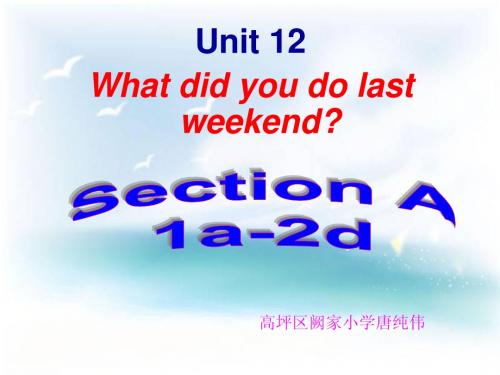
He studied for his English test.
Where did Jack go last weekend?
He went to the farm.
What did he do there?
He fed some cows there.
sheep
butterfly
visitor
1. sheep 名词,意为“绵羊”。它是单复 数同形的单词,当它作主语时谓语动词 的单复数形式要根据它在句中的意思来 确定。类似的单词还有deer (鹿), Chinese (中国人)等。例如: Where are your sheep, Ted? Every sheep has a thick woolly coat. 每只羊身上都穿着一件厚的羊毛外套。
2. I worked as a guide at the Natural History Museum. 我在自然历史博物馆里做导游的工作。 “work as + 职业” 意为“做某工作”。 例如: 埃里克在那家俱乐部里做音乐老师的工 作。 Eric works as a music teacher in the club.
What did he do?
He went to the cinema.
What did they do?
They went to the beach.
What did they do?
They went fishing.
What did he do last weekend?
He did his homework.
Student A asks questions with who, 2c what or where and Student B answers. Then change roles.
新目标版英语七年级下册 Unit12Whatdidyo Udolastweekend?同步练习及答案
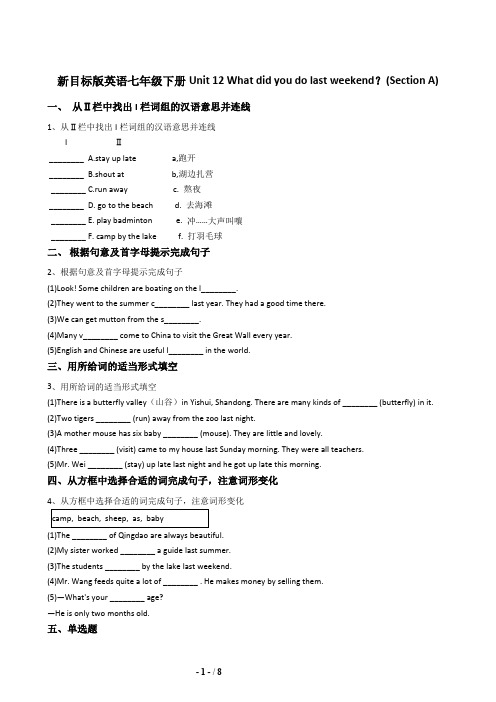
新目标版英语七年级下册Unit 12 What did you do last weekend?(Section A)一、从Ⅱ栏中找出I栏词组的汉语意思并连线1、从Ⅱ栏中找出I栏词组的汉语意思并连线I Ⅱ________ A.stay up late a,跑开________ B.shout at b,湖边扎营________ C.run away c. 熬夜________ D. go to the beach d. 去海滩________ E. play badminton e. 冲……大声叫嚷________ F. camp by the lake f. 打羽毛球二、根据句意及首字母提示完成句子2、根据句意及首字母提示完成句子(1)Look! Some children are boating on the l________.(2)They went to the summer c________ last year. They had a good time there.(3)We can get mutton from the s________.(4)Many v________ come to China to visit the Great Wall every year.(5)English and Chinese are useful l________ in the world.三、用所给词的适当形式填空3、用所给词的适当形式填空(1)There is a butterfly valley(山谷)in Yishui, Shandong. There are many kinds of ________ (butterfly) in it.(2)Two tigers ________ (run) away from the zoo last night.(3)A mother mouse has six baby ________ (mouse). They are little and lovely.(4)Three ________ (visit) came to my house last Sunday morning. They were all teachers.(5)Mr. Wei ________ (stay) up late last night and he got up late this morning.四、从方框中选择合适的词完成句子,注意词形变化4、从方框中选择合适的词完成句子,注意词形变化camp, beach, sheep, as, baby(1)The ________ of Qingdao are always beautiful.(2)My sister worked ________ a guide last summer.(3)The students ________ by the lake last weekend.(4)Mr. Wang feeds quite a lot of ________ . He makes money by selling them.(5)—What's your ________ age?—He is only two months old.五、单选题5、Tom usually goes fishing __________ Sunday morning.A、atB、onC、forD、in6、—Hello, Mum. Are you still on Lushan Mountain?—Oh, no. We are back home. We __________ a really good journey.A、haveB、hadC、are havingD、will have7、—__________ did he visit last summer?—Sydney.A、WhatB、WhenC、WhoD、Where8、Mr. Jackson keeps lots of __________ on his farm.A、sheepB、chickenC、gooseD、pandas9、—What did you do yesterday evening, Gina?—I __________Titanic 3D in the City Cinema.A、watchB、watchedC、am watchingD、will watch10、—__________ did you visit the Science Museum?—Three months ago.A、WhenB、WhereC、WhatD、Which11、I worked __________a waiter (侍者) in a hotel last winter.A、toB、forC、andD、as12、They were all very __________, but none (一个没有) of them took a rest.A、happyB、excitedC、tiredD、relaxed13、—Have you had your breakfast yet?—Yes, Mom __________ it for me.A、was cookingB、is cookingC、will cookD、cooked14、—Who fed so many cows?—My uncle __________.A、doB、doesC、didD、doing六、根据汉语提示完成句子15、根据汉语提示完成句子(1)Mr. Sun and his family visited the ________ ________ ________ (自然历史博物馆).(2)My son often ________ ________ ________ (熬夜) last summer vacation.(3)That boy ________ ________ (跑开) when he saw the police.(4)Don't ________ ________ (冲……大声叫嚷) the ________ (婴儿). She is too young.(5)The ________ (耗子) has their own (自己的) ________ (语言).七、对画线部分提问16、对画线部分提问(1)Jim played the guitar last night.________ ________ Jim ________ last night?(2)They went to Canada last week.________ ________ they ________ last week?(3)My school trip was great.________ was ________ school trip?(4)I played soccer with my classmates last Sunday.________ ________ you ________ soccer with last Sunday?(5)Jim went to the cinema yesterday.________ went to the cinema yesterday?八、补全对话17、补全对话A. Who did you go there with?B. When did you go there?C. Yes, we did.D. Where did you go last weekend,Vera?E. How was your weekend?M: ________(1) W: I went to Hangzhou and Suzhou.M: ________(2) W: On October 3rd.M: ________(3) W: My parents, my aunt and uncle.M: ________(4) W: It was excellent.M: Oh, great! Did you take any photos there?W: ________(5)M: Let me have a look at them when they come out (冲印出来). W: Sure.九、任务型阅读18、任务型阅读John had a busy weekend. On Saturday morning, he went to the library and studied math. On Saturday afternoon, he went to the park. He played tennis with his friend. Lisa was busy on Saturday, too. She cleaned her room in the morning. In the afternoon, she wrote a letter to her cousin(表妹).On Sunday morning, John and Lisa read books at home. On Sunday afternoon, they practiced English. In the evening, they saw an interesting talk show with their parents. They had great fun.(1)John went to the library and studied math. Lisa cleaned her room.(2)Who did John play tennis with?(3)When did Lisa write a letter?(4)在短文中找出下列动词的过去式have ________ is________ see________ read________ write________(5)把短文中画线句子翻译成汉语答案解析部分一、从Ⅱ栏中找出I栏词组的汉语意思并连线1、【答案】C①E②A③D④F⑤B【解析】【分析】考查短语的英汉互译,注意以下几个:A 中用late,不是later;B中用at而不是to;E中不能加任何冠词。
人教版新目标英语七年级下册Unit12单元目标解读-新版

Unit12 单元目标解读新目标人教版七年级下册Unit12 What did you do last weekend? 周末活动 (Weekend activities)【单元话题】周末活动【教材内容】本单元围绕“周末活动”主题展开,运用一般过去时谈论刚刚过去的一些常见周末活动,以此展开多种形式的语言训练。
【单元教材解读】基于课程标准:英语课程标准《2011年版》指出通过英语学习使学生形成初步的综合运用语言的能力,促进心智发展,提高综合人文素养。
它包括五个维度及语言知识、语言技能、学习策略、文化意识和情感态度。
而进来核心素养的提出,也指出教师要发展学生的学科核心素养,培养学生的关键能力及语言能力、学习能力和必备品格文化品格和思维品质。
七年级的学生要求达到课标要求的三级目标,简单表述为对英语学习的积极性和初步的自信心。
能听懂有关熟悉话题的语段和简短的故事。
能读懂小故事及其他文体的简单书面材料。
能根据图片用短语和句子进行描述,编写简单的故事。
能在真实的情景中进行分角色对话表演等活动。
在学习中善于利用图画等非语言信息理解主题,能在小组合作中积极与他人合作,相互帮助,共同完成学习任务。
能意识到语言交际中存在的文化差异,能初步了解英语国家的地理位置。
基于教材:本单元分为section A,section B和self-check三个大的部分,总体来说三部分之间存在知识的宽度与难度的阶梯递进逻辑关系。
Section A部分以周末活动为主线,运用一般过去时谈论刚刚过去的一些周末活动。
1a-1c 通过Lucy的周末活动和听力输入导入本单元的话题和本部分的关键句型。
1a活动引出“谈论周末活动”的话题及所要用到的What did you do last weekend?这个句式,同时复习一些表示周末活动的动词短语,学习一些新短语,如camp by the lake, go to the beach, play badminton。
七年级下册unit12_what_did_you_do_last_weekend__section_A
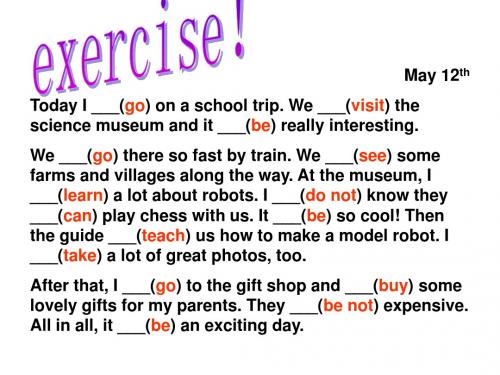
Unit 12
What did you do last weekend?
Xiaoxin had a very busy weekend!
What did Xiaoxin do last weekend ?
7:00
11:00
9:00
played play the guitar
played play soccer
20:00
21:00
作业还是要写滴!!!
swam swim in the pool
have had a shower
did do homework
went boating
camped by the lake
did homework played badminton
went to the beach went to the cinema
Exercise2
Sunday morning Sunday afernoon Sunday evening
Saturday morning
Saturday afternoon
Saturday evening
Group 1: do homework play soccer clean the room go to the beach Kenan visit grandparents write a letter have a party Group 3: do some reading go to the library write a letter to Xiaoxin study for the test play the guitar practice English have a school trip
人教版新目标七年级下学期Unit-12--what-did-you-do-last-weekend--知识点

Unit 12 what did you do last weekend?Section A 知识讲解一. last(1)last形容词“最后的,最末的”或者“紧接前面的,刚过去的”。
Today is the last day in the year.最后一天。
I didn’t sleep well last night. 昨晚(2)last副词,“最后地”,I’m the last one.最后一个。
(3)last 动词,“持续,继续,维持”等,The hot weather lasted a week.持续了一周。
二. camp(1)camp 动词,“扎营,搭帐篷”。
We go camping every summer.We walked all day and camped by a river at night.(2)camp 名词,“露营地,度假营”。
Let’s go back to the camp, it’s getting dark. 让我们回营地吧,天黑下来了。
根据汉语提示填空。
(1)When did you join the ______ ______ (夏令营)?(2)I like ______ ______ (去宿营)in the open air.3)We______(宿营)in the forest last night. (4)Let’s go back to the ______(营地)三. sheepsheep 可数名词,“绵羊”,复数还是sheep;goat指山羊。
How many sheep are there on your farm? 你们农场里有多少只羊?拓展:常见的单复数同形的名词还有:deer (鹿),fish (鱼),Chinese (中国人),Japanese(日本人)等。
四. byby介词, “在……旁边”,相当于beside。
Our teacher is sitting by the window.by与交通工具名词连用时,名词前不用冠词,意为“乘、坐、用”等。
人教新目标七年级英语下册课堂笔记Unit 12 What did you do last weekend

Unit 12 What did you do last weekend?2012版人教新目标七年级英语下册课堂笔记1. camp v. 扎营;搭帐蓬Where did you camp last night?go camping去野营camp out野营;露营campn.营地;阵营2. lake n. 湖;湖泊There is no fish in this lake.on the lake在湖面上in the lake在湖里3. beach n. 海滩;沙滩They walked along the beach.复:beacheson the beach在海滩上4. sheep n. 绵羊;羊复:sheep There are 3 sheep eating grass under the tree.5. as prep.作为,当作as像……一样As a student, you should study hard.6. natural adj. 自然的My mother uses natural gas to cook meals.naturaladj.天生的7. visitor n. 游客;访问者近:touristn.旅游者;游客She is showing some visitors around our school.8. tired adj. 疲劳的;疲倦的He looks tired today.近:tiringadj.累人的be tired of对……厌烦tiredadj.厌烦的;厌倦的9. stay v. 停留;待Please stay at home.反:leavev.离开stay up熬夜stayn.停留;逗留v.保持10. away adv. 离开;远离People began to move away.run away跑开go away走开awayadv.在远处11. mouse n. 老鼠;耗子I saw 2 mice in the kitchen.复:micemousen.鼠标;胆上如鼠的人12. baby adj. 幼小的;婴儿The baby deer can stand up now.复:babies13. shout v. 呼叫;喊叫You shouldn’t shout at old people.shout at冲……大声叫嚷14. language n.语言They learn the language through songs and games.foreign language外语body language肢体语言mother language母语1. fly v. 飞The little bird still can’t fly.fly away飞走flyn.苍蝇2. kiteThat kite looks like a butterfly.fly a kite放风筝3. high adj. & adv. 高的(地)There is a high mountain at the back of the house.My kite can fly high in the sky.近:tall反:lowhigh school中学height高度4. ago adv. 以前He left here 3 days ago.近:beforelong time ago很久以前5. India n. 印度He lives in India with his mother.Indianadj.印度的,印度人6. tentPeople sleep in tents when they go camping.put up a tent搭帐篷tentv.住帐篷7. moon n. 月亮There is no water or air on the moon.full moon满月8. surprise n. 惊奇;惊讶v. 使吃惊He looked at me in surprise.The news surprised me.in surprise惊奇地to one’s surprise使某人吃惊的是get a surprise吃惊surprisedadj.感到惊讶的surprisingadj.令人惊讶的9. snake n. 蛇There is a snake in the grass.10. scared adj. 惊慌的; 吓坏了的。
最新人教版新目标英语七年级下《Unit 12 What did you do last weekend全单元教学设计及教学反思》精品教案

8.备考____________
9.work as a guide____________
10.over____________
11.How interesting!____________
12.living habits____________
13.kind of________ 14.熬夜________
(Keys:1.do homework,2.go to the beach,3.去划船,4.play badminton,5.go t
o the cinema,6.在湖边野营,7.看望我的奶奶,8.study for the test,9.当导游,10.超
(最新精品教学设计)
Unit 12 What did you do last weekend?
第一课时 Section A(1a-2d)
Target Navigation 【目标导航】 Key words and phrases: camp,lake,beach,badminton,sheep,as,natural,butterfly,visitor,tired, stay,stay up late Key sentences: 1.—What did you do last weekend? —Well,on Saturday morning,I played badminton. 2.—Who visited her grandma? —Becky did. Skills:学会谈论过去事件。 Emotion:积极参与小组活动,大胆展示。 The guidance of learning methods 【学法指导】 1.通过多媒体课件展示图片,创设情境,让学生对用过去时描述事件有感观的认识。 2.通过同伴之间编写、演练对话来操练句型和巩固新单词。 3.通过听录音并记录所听到的信息来巩固单词和句型。 Learning important and difficult points【学习重难点】 1.进一步学习过去时态的用法。 2.继续学习谈论过去事件;学会用疑问词 who,what,when。 Teaching Steps 【教学过程】 Autonomous Learning Scheme 【自主学习方案】 预习指导与检测
unit_12_What_did_you_do_last_weekend?词句精讲精练
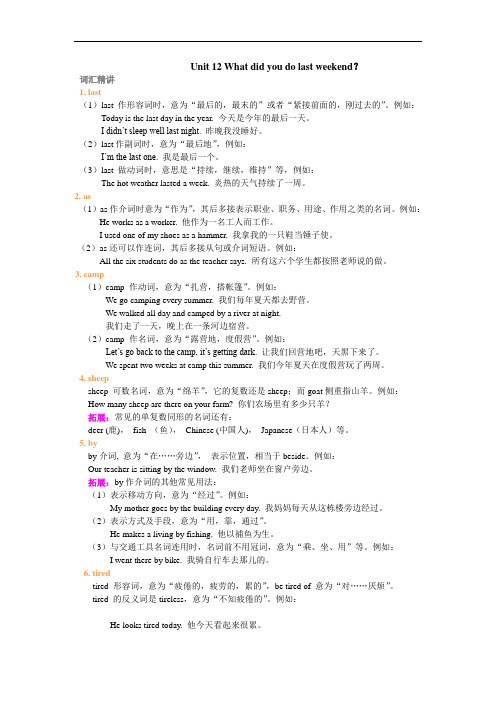
Unit 12 What did you do last weekend?词汇精讲1. last(1)last 作形容词时,意为“最后的,最末的”或者“紧接前面的,刚过去的”。
例如:Today is the last day in the year. 今天是今年的最后一天。
I didn’t sleep well last night. 昨晚我没睡好。
(2)last作副词时,意为“最后地”,例如:I’m the last one. 我是最后一个。
(3)last 做动词时,意思是“持续,继续,维持”等,例如:The hot weather lasted a week. 炎热的天气持续了一周。
2. as(1)as作介词时意为“作为”,其后多接表示职业、职务、用途、作用之类的名词。
例如:He works as a worker. 他作为一名工人而工作。
I used one of my shoes as a hammer. 我拿我的一只鞋当锤子使。
(2)as还可以作连词,其后多接从句或介词短语。
例如:All the six students do as the teacher says. 所有这六个学生都按照老师说的做。
3. camp(1)camp 作动词,意为“扎营,搭帐篷”。
例如:We go camping every summer. 我们每年夏天都去野营。
We walked all day and camped by a river at night.我们走了一天,晚上在一条河边宿营。
(2)camp 作名词,意为“露营地,度假营”。
例如:Let’s go back to the camp, it’s getting dark. 让我们回营地吧,天黑下来了。
We spent two weeks at camp this summer. 我们今年夏天在度假营玩了两周。
4. sheepsheep 可数名词,意为“绵羊”,它的复数还是sheep;而goat侧重指山羊。
最新七年级英语下册《Unit 12 What did you do last weekend》教学设计 (新版)人教新目标版
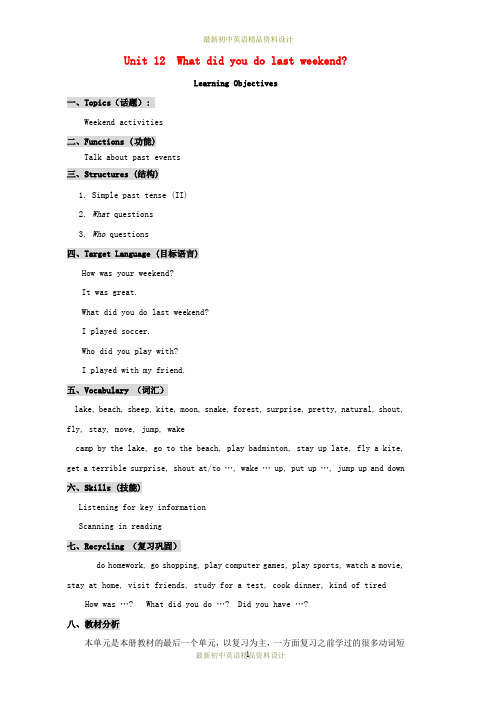
Unit 12 What did you do last weekend?Learning Objectives一、Topics(话题):Weekend activities二、Functions (功能)Talk about past events三、Structures (结构)1. Simple past tense (II)2. What questions3. Who questions四、Target Language (目标语言)How was your weekend?It was great.What did you do last weekend?I played soccer.Who did you play with?I played with my friend.五、Vocabulary (词汇)lake, beach, sheep, kite, moon, snake, forest, surprise, pretty, natural, shout, fly, stay, move, jump, wakecamp by the lake, go to the beach, play badminton, stay up late, fly a kite, get a terrible surprise, shout at/to …, wake … up, put up …, jump up and down 六、Skills (技能)Listening for key informationScanning in reading七、Recycling (复习巩固)do homework, go shopping, play computer games, play sports, watch a movie, stay at home, visit friends, study for a test, cook dinner, kind of tired How was …? What did you do …? Did you have …?八、教材分析本单元是本册教材的最后一个单元,以复习为主,一方面复习之前学过的很多动词短语,一方面通过以谈论上周末的活动为话题,继续巩固学习一般过去时态的应用。
新目标人教版英语七年级下册Unit 12 What did you do last weekend?单元过关试题及答案

Unit 12单元过关卷时间:100分钟满分:120分第Ⅰ卷听力部分(20分)Ⅰ. 关键词语选择(共5小题;每小题1分,满分5分)1. A. luck B. park C. lake2. A. tired B. afraid C. scared3. A. sheep B. snake C. sleep4. A. walk B. work C. wake5. A. stay up B. cut up C. put upⅡ. 短对话理解(共5小题;每小题1分,满分5分)6. What will they do?A B C7. What did Eric do last Saturday?A B C8. What did Jeff see by the river yesterday?A B C9. What is the boy doing?A B C10. How did Dale go to the cinema last weekend?A B CⅢ. 长对话理解(共5小题;每小题1分,满分5分)听下面一段对话,回答第11、12小题。
11. What is Peter doing now?A. Reading a storybook.B. Watching TV.C. Reading a newspaper.12. Where did Peter go last Monday?A. To the beach.B. To the library.C. To the bookstore.听下面一段对话,回答第13至15小题。
13. Where did Jack live in childhood?A. In the city.B. In the countryside.C. In the town.14. Who helped Jack with his studies?A. His uncle and aunt.B. His teachers.C. His parents.15. How many rooms did the house have?A. Five.B. Six.C. Seven. Ⅳ. 信息转换(共5小题;每小题1分,满分5分)第Ⅱ卷笔试部分(100分)Ⅴ. 单项填空(共10小题;每小题1分,满分10分)21. —My friends and I will go fishing today.—________A. My pleasure.B. Thanks a lot.C. Have a nice day!D. Nice to meet you.22. Robinson Crusoe made a fire ________ the meat.A. to cookB. cookC. cookingD. cooked23. —Our classmates are going to Fantawild Adventure(方特欢乐世界)after the exams.—________ exciting idea!A. WhatB. What anC. How anD. How24. —What do you think of English?—It's a useful ________, so we must learn it well.A. questionB. languageC. messageD. problem25. —Is ________ OK?—Yes, I get on well with my classmates and I like my school life.A. somethingB. anythingC. everythingD. nothing26. —Was your mother busy yesterday?—Yes, she was. She ________ the house all day.A. cleansB. is cleaningC. will cleanD. cleaned27. —What were the students doing when you came into the classroom?—I saw them ________ games.A. playB. to playC. playingD. played28. —How was your trip?—________. I had a good time camping in the forest.A. It was greatB. It was terribleC. That sounds greatD. Lucky you29. —Jenny, please come here and help me ________ the tent.—OK. I'm coming.A. put upB. cut upC. put onD. cut down30. —I was surprised to see you at the library so early in the morning.—________, huh?A. Every dog has its dayB. East or west, home is the bestC. Where there is a will, there is a wayD. The early bird catches the wormⅥ. 完形填空(共10小题;每小题1. 5分,满分15分)Hello! I'm in Sanya now. My parents and I arrived here ________(31)plane yesterday. My uncle met us at the airport (机场). We were a little ________(32), so we had a rest after we arrived at my uncle's home.Yesterday evening, we had dinner in a Chinese ________(33). The food was delicious there. After dinner, my cousin and I watched a(n) ________(34) soccer game on TV, because soccer is our favorite sport. When I ________(35) this morning, it was 7 o'clock. After breakfast, my family and I went to the beach. We swam in the sea and played volleyball on the beach________(36). We had a great time there. This afternoon, we ________(37) a walk along a busy street. There were many shops on both sides of the street. I loved this kind of street________(38) the shops sold all kinds of things at very good prices. I ________(39) some gifts for my friends.Now we're camping by a lake. My parents are putting up________(40). We will spend a good night here. How relaxing it will be!31. A. on B. for C. by D. with32. A. tired B. lucky C. happy D. scared33. A. bank B. restaurant C. library D. hospital34. A. lazy B. strict C. quiet D. exciting35. A. put up B. stayed up C. woke up D. got lost36. A. luckily B. early C. usually D. happily37. A. spent B. took C. kept D. crossed38. A. or B. so C. but D. because39. A. bought B. told C. showed D. left40. A. trees B. pictures C. tents D. clothesⅦ. 补全对话(共5小题;每小题1分,满分5分)A:Hello, Helen! What did you do last weekend?B: (41)________A: (42)________B:We played badminton.A:That sounds interesting. (43)________B:It was sunny.A:But it was rainy in my town.B: (44)________A:It was boring. I didn't want to do anything.B:Oh! (45)________ See you.A:Bye.A. How was the weather in your town?B. I have to go.C. I went there with my parents.D. What did you do?E. Who did you go there with?F. Well, I visited my friend.G. How was your weekend?Ⅷ. 阅读理解(共15小题;每小题3分,满分45分)AThis happened (发生) about two years ago. I went to an art festival in France with my friends. The festival would last (持续) five days.When we arrived, the weather was great. It was very hot and sunny, so we went to the mountains for camping. But in the mountains the weather changed (变化) quickly. That night there was a terrible storm. At first we didn't worry about it, but itinto the tent. In the end, we had to leave and take our things to a hotel. There weren't any free rooms, so they let us sleep in the dining room. The next morning, it was sunny again. But our tent wasn't there. The wind blew it away at night.46. Where did the writer go for the art festival?A. To China.B. To the UK.C. To the USA.D. To France.47. The underlined word “storm” means ________ in Chinese.A. 暴风雨B. 雨夹雪C. 冰雹D. 大雾48. Where did the writer sleep that night?A. At home.B. In a hotel.C. In the tent.D. At a friend's home.49. Which of the following is TRUE?A. The art festival was one week long.B. The writer didn't enjoy the camping.C. The writer couldn't find his bag the next morning.D. The bad weather in the mountains lasted two days.BHere are some of John's diaries(日记).50. What was the weather like on Saturday?A. Fine.B. Cloudy.C. Rainy.D. Snowy.51. What did John have for lunch on Sunday?A. Some rice and vegetables.B. Some hamburgers and bread.C. A bowl of noodles and some chicken.D. Two hamburgers and some vegetables.52. John stayed at the hotel on Sunday because ________.A. it rained that dayB. he didn't like to go outC. he liked watching TV thereD. he wanted to have a good sleep53. Which of the following is TRUE?A. It was windy and cool on Friday.B. John went to Tian'anmen Square himself.C. John thought teaching the children to swim was fun.D. John watched an interesting movie on Sunday evening.CDean could plant (种植) apple trees well. He often gave other people apples. One day, Dean gave John a young apple tree. He told John, “You can take it home and plant it, and then you can get many apples. ”John was very happy. But when he got home, he didn't know where to plant the young apple tree. He was afraid that if he planted the tree near the street, strangers (陌生人) would take the fruits; if he planted the tree near his house, his neighbors would take some of the apples; if he planted the tree in his garden, his children would take the fruits.At last, he planted the apple tree in his room, so others couldn't see it. But the tree died (死了) soon. John was very sad. He told Dean about it.“Yes,” said Dean, “Others can't enjoy the fruits if you plant the tree in your roo m.54. Why did Dean give John a young apple tree?A. Because they were good friends.B. Because he had many apple trees.C. Because he didn't want to give John apples any more.D. Because he wanted John to have many apples.55. Which of the following is TRUE?A. The young apple tree died at last.B. Dean never gave apples to others.C. Dean wasn't good at planting apple trees.D. John planted the apple tree with his children.56. From the passage, we know that ________.A. John is very cleverB. John is very friendly to othersC. John only thinks about himselfD. John likes to learn from his friends57. What's the best title of this passage?A. An apple treeB. John and his friendC. How to plant treesD. How to be a good fatherD阅读下面短文,并用英语回答问题(请注意每小题后面的词数要求)。
2012新版新目标英语七年级下册课文及翻译
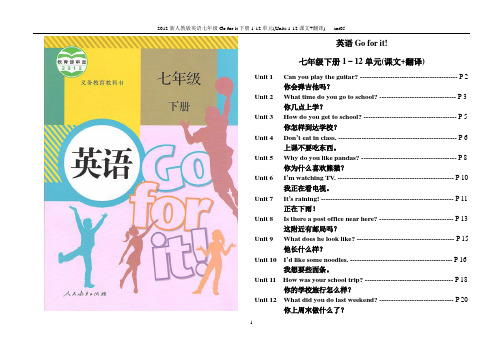
英语Go for it!七年级下册1 – 12单元(课文+翻译)Unit 1 Can you play the guitar? ------------------------------------------ P 2你会弹吉他吗?Unit 2 What time do you go to school? --------------------------------- P 3你几点上学?Unit 3 How do you get to school? ---------------------------------------- P 5你怎样到达学校?Unit 4 Don’t eat in class. --------------------------------------------------- P 6上课不要吃东西。
Unit 5 Why do you like pandas? ----------------------------------------- P 8你为什么喜欢熊猫?Unit 6 I’m watching TV. -------------------------------------------------- P 10我正在看电视。
Unit 7 It’s raining! --------------------------------------------------------- P 11正在下雨!Unit 8 Is there a post office near here? -------------------------------- P 13这附近有邮局吗?Unit 9 What does he look like? ------------------------------------------ P 15他长什么样?Unit 10 I’d like some noodles. -------------------------------------------- P 16我想要些面条。
新目标版英语七年级下册Unit12Whatdidyoudolastweekend?(SectionB)含答案
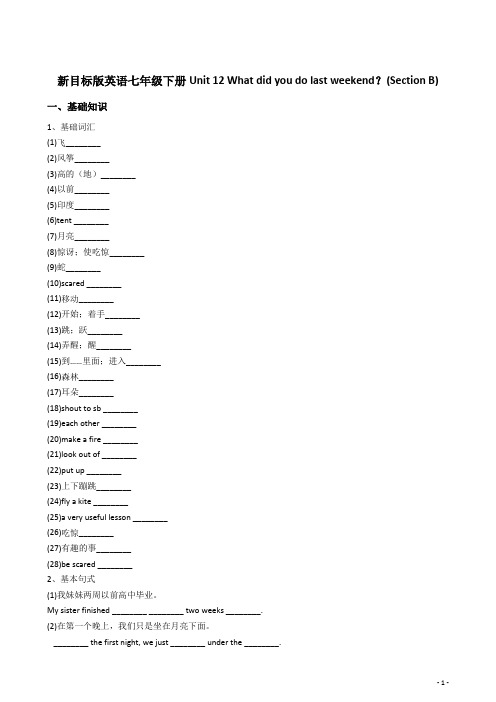
新目标版英语七年级下册Unit 12 What did you do last weekend?(Section B)一、基础知识1、基础词汇(1)飞________(2)风筝________(3)高的(地)________(4)以前________(5)印度________(6)tent ________(7)月亮________(8)惊讶;使吃惊________(9)蛇________(10)scared ________(11)移动________(12)开始;着手________(13)跳;跃________(14)弄醒;醒________(15)到……里面;进入________(16)森林________(17)耳朵________(18)shout to sb ________(19)each other ________(20)make a fire ________(21)look out of ________(22)put up ________(23)上下蹦跳________(24)fly a kite ________(25)a very useful lesson ________(26)吃惊________(27)有趣的事________(28)be scared ________2、基本句式(1)我妹妹两周以前高中毕业。
My sister finished ________ ________ two weeks ________.(2)在第一个晚上,我们只是坐在月亮下面。
________ the first night, we just ________ under the ________.(3)对我来说,这是一个非常有用的教训。
This was a very ________ lesson ________ me.(4)我爸爸开始在他们的帐篷里跳上跳下。
My dad started to ________ ________ ________ ________ ________ their ________.(5)我是如此累,以至于很早就去睡了。
人教新目标版七年级英语下册Unit12Whatdidyoudolastweekend?优质教案
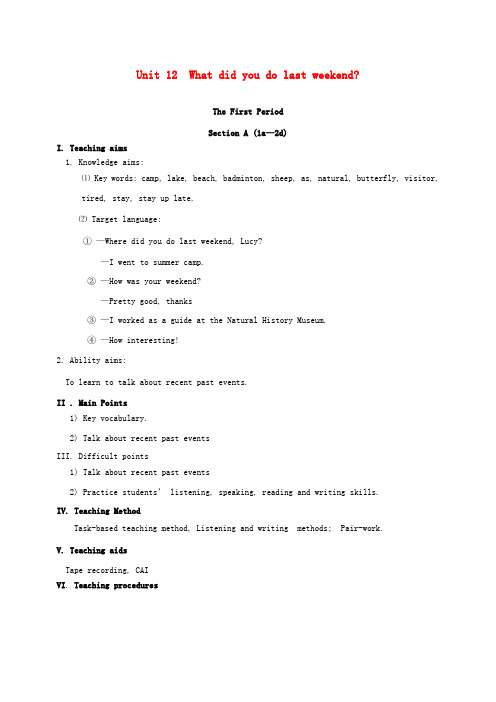
Unit 12 What did you do last weekend?The First PeriodSection A (1a—2d)I. Teaching aims1. Knowledge aims:⑴ Key words: camp, lake, beach, badminton, sheep, as, natural, butterfly, visitor,tired, stay, stay up late.⑵ Target language:①—Where did you do last weekend, Lucy?—I went to summer camp.② —How was your weekend?—Pretty good, thanks③ —I worked as a guide at the Natural History Museum.④ —How interesting!2. Ability aims:To learn to talk about recent past events.II . Main Points1) Key vocabulary.2) Talk about recent past eventsIII. Difficult points1) Talk about recent past events2) Practice students’ listening, speaking, reading and writing skills.IV. Teaching MethodTask-based teaching method, Listening and writing methods; Pair-work.V. Teaching aidsTape recording, CAIVI. Teaching proceduresReflections:The Second PeriodSection A (Grammar Focus – 3c )Ⅰ. Teaching aims1. Knowledge aims:⑴ Key words: away, mouse, baby, shout ,shout at, woof, language.⑵ Target language:—What did you do last weekend?—I did my homework.—Who visited her grandma?—Becky did.—Where did she go last weekend?—She went to a farm.—Who did she go with?—She went with her classmates.2. Ability aims:Talk about recent past events3. Emotion aims:To remember the key words and target language.II . Main Points1) Key vocabulary.2) Talk about recent past eventsIII. Difficult points1) Talk about recent past events2) Practice students’ listening, speaking, reading and writing skills. IV.Teaching MethodTask-based teaching method, PairworkV. Teaching aidsTape recording, some pictures.Reflections:The Third PeriodSection B ( 1a –1e )I. Teaching aims1. Knowledge aims:⑴ Key vocabulary: fly, kite, fly a kite.⑵ Target language:—Did you go anything interesting last weekend?—Not really, but I visited my sister.—My sister finished high school two weeks ago.2.Ability aims:To improve students’ listening, speaking, reading and writing abilitie s.3. Emotion aims: Learn to communicate with others .II. Main Points1) Key vocabulary.2) Talk about recent past events.III. Difficult points1) Talk about recent past events2) Practice students’ listening, speaking, reading and writing skills. IV. Teaching MethodTask-based teaching methodV. Teaching aidsTape recording, CAIVI. Teaching proceduresReflections:The Fourth PeriodSection B (2a – self check )Ⅰ. Teaching aims1. Knowledge aims:(1).Keywords: moon, jump, wake, forest, ear, sing-sang, study –studied, have –had, go-went, fly- flew, swim-swam, put up, get a surprise, shout to, up and down, wake...up,high school,⑵ Target language:---Did you go anything interesting last weekend?---Not really, but I visited my sister.---My sister finished high school two weeks ago.2. Ability aims: Train students’ reading and writing skills.3. Emotion aims: Help students learn from each other and work together .II. Main PointsTo learn to talk about weekend activities using simple past tense.III. Difficult pointsUse the simple past tense to write a passage.IV. Teaching MethodTask-based teaching methodV. Teaching aidsTape recording, pictures.Reflections:。
2023年新版新目标英语七年级下册unit12知识点总结

Unit12 What did you do last weekend?Section A1.camp(1)vi 宿营;露营;扎营go camping 去野营camp out 野营露营(2)n.野营;帐篷;营地summer camp 夏令营winter camp 冬令营2.by(1)by+地点名词表方位,在…旁边by the lake/river/tree/window/door by the side of the path.在路边注:表从…旁通过,多与动词go/walk/pass等连用。
(2)by+时间名词到…时(已发生某事),谓语多用完毕时;最晚、不迟于…,在…之前by now/then/this time/next Friday/the end of/three o`clock等。
By the end of last year,another new gymnasium had been completed到去年年终,又有一座新体育馆峻工了。
(3)by+名词表措施、方式、手段等。
A. by+the+可数旳时间、长度、重量等名词。
按…计算,按…买(卖)by the pound/ton/yard/meter/dozen/bale/day/month等。
B. by+表达时间、长度、重量等总称旳不可数名词(名词前不加冠词)。
按…计算,按…买(卖)by time/volume/length/weight/height/depth/width/area等。
C. by+交通工具、交通方式名词(名词前不加冠词,不变复数)。
通过…,由…,乘…by train/rail/tube/taxi/bus/truck/bike/boat/plane;by land/road/sea/water/air等。
(on foot)D. by+抽象名词或具有抽象意义旳一般名词(名词前不加冠词,不变复数)靠…,通过…,由…所致by skill/determination/practice/diligence/inference/chance/accident;by mail/letter/radio/fax/telephone/telegraph/hand/machine等。
人教新目标版七年级英语下册Unit12Whatdidyoudolastweekend(第5课时)教学设计

A: How was the weekend?
B: It was fun an d relaxing.
2
仿照上述 对话,组织Pair-work复习活动
T: OK. Let’s do pair-work: Talk about your last weekend.
15
组织Pair-work,巩固动词的一般过去时态和what, how, where引导的特殊疑问句
1.引导学生读懂任务要求,学生独立完成 。
2.学生两人一组采取对话形式交流、检查答案,体会特殊疑问句
的用法。
3.请三组学生分别朗读对话。
4.引导学生观察对话,总结how, where引导的特殊疑问句的
What did you do last weekend
Unit 12
What did you do last weekend?
Period 5
Content Section B 3a, 3b, Self Check
教学目标要求
1.能够使用提供的信息(图片,短文),通过补全短文完成控制性写作练习。
2.能够使用所学的目标句型完成陈述自己周末活动的写作练习。
8
组织小组讨论,总结陈述周末活动的文章的写作要素
1 .引导学生观察语言结构。
2.小组讨论,总结写作要点。
3.教师帮助,列出写作要点,提醒学生:描述过去的周末活动时
注意按时间顺序以及用过去时态。
9
罗列周末活动及时间,为3b的写作练习做必要的铺垫
1.学生按时间顺序罗列出自己的周末活动。
2.学生两人一组相互交流,检查表示活动的动词的过去式。
2013版新目标英语七年级下册unit12_What_did_you_do_last_weekend_Section_B(4) 2
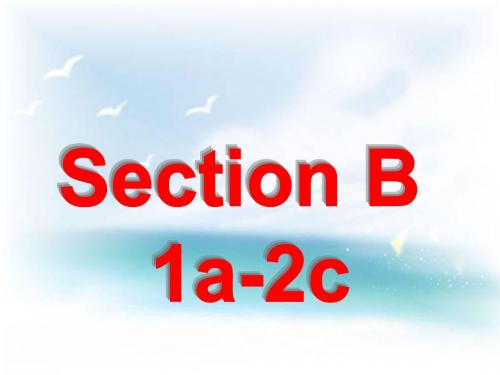
I went to the cinema with my friends.
What kinds of animals are people 2a sometimes afraid of? Why? Make a list. I think people are afraid of tigers, lions and snakes because they’re scary.
kite
fly
fly a kite
swimming pool
Here are some things that Sally and Jim 1a did yesterday. Match the activities with the pictures.
1. sang and played the guitar __ d 2. studied for a test __ c 3. had dinner with friends __ f 4. went to the library __ e 5. flew a kite __ a 6. swam in a swimming pool __ b
Describe what you did on your last weekend to your classmates. My last weekend was interesting. I visited my grandparents. They lived in a small village. I fed the chickens and sheep. I went fishing with my grandpa.
She went to the library.
How was Jim’s last weekend?
人教新目标版七年级英语下册Unit12WhatdidyoudolastweekendSectionB1a_1e教案新版
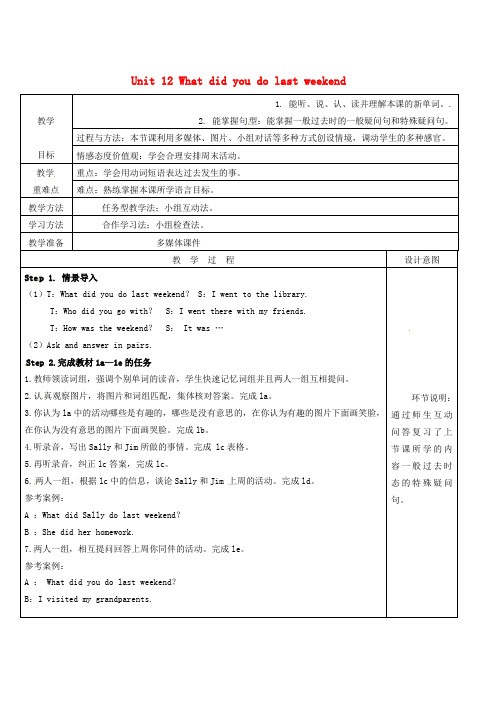
教学
目标
1.能听、说、认、读并理解本课的新单词。.
2.能掌握句 型:能掌握一般过去时的一般疑问句和特殊疑问句。
过程与方法:本节课利用多媒体、图片、小组对话等多种方式创设情境,调动学生的多种感官。
情感态度价值观:学会合理安排周末活动。
(2)—did you go last Satur day?
—I went to the Great Wall.
A.What B.how C.when D.Where
(3)hevolleyball last Friday?
A. Does;play B. Did;played C. Is ;playingD. Did;play
参考案例:
A:What did Sally do last weekend?
B:She did her homework.
7.两人一组,相互提问回答上周你同伴的活动。完成le。
参考案例:
A:What did you do last weekend?
B:I visited my grandparents.
T:Who did you go with?S:I went as the weekend?S:It was…
(2)Ask and answer in pairs.
Step 2.完成教材1a—1e的任务
1.教师领读词组,强调个别单词的读音,学生快速记忆词组并且两人一组互相提问。
环节说明:通过听说训练,学生更熟练地掌握交际用 语,通过小结训练,语言目标得以强化。
板
书
设
计
Unit 12 What did you do last weekend?
- 1、下载文档前请自行甄别文档内容的完整性,平台不提供额外的编辑、内容补充、找答案等附加服务。
- 2、"仅部分预览"的文档,不可在线预览部分如存在完整性等问题,可反馈申请退款(可完整预览的文档不适用该条件!)。
- 3、如文档侵犯您的权益,请联系客服反馈,我们会尽快为您处理(人工客服工作时间:9:00-18:30)。
一、一般过去时态的特殊疑问句。
ቤተ መጻሕፍቲ ባይዱ
1. 特殊疑问词 +was/were + 主语
+ 其他?
上个周末你过得怎么样? How was your last weekend? _____ ____
昨天下午他们在哪里? Where _____ _______were they yesterday afternoon? 昨天晚上谁在教室里? Who was in the classroom last ____ ____ night?
He studied for his English test.
Where did Jack go last weekend?
He went to the farm.
What did he do there?
He fed some cows there.
sheep
butterfly
visitor
Well, on Saturday morning, I played badminton.
What did you do on Saturday afternoon?
I went to the beach.
What did you do on Saturday night?
I went to a movie.
Listen and underline 2a the words you hear. 1. I visited my (aunt / ________ grandma). _________ 2. I did my (homework / sports). 3. I studied for the (English / math) test. _______ 4. I went to a (farm / beach). _____ 5. I fed some (sheep / _____ cows).
2d Role-play the conversation.
Paul: Hi, Lisa. How was your weekend? Lisa: Great. Thanks. Paul: What did you do? Lisa: I worked as a guide at the Natural History Museum.
What did he do?
He went to the cinema.
What did they do?
They went to the beach.
What did they do?
They went fishing.
What did he do last weekend?
He did his homework.
阅读Grammar Focus部分,完成下列句子。
1. 上个周末你做什么了? What did you do last weekend? _______________________ 2. 我做了我的家庭作业。 I did my homework. __________________
3. 我们去划船了。 We went boating. _______________
Sunday night
Saturday night Saturday afternoon
Sunday afternoon
Saturday morning
Sunday morning
What did he do?
He played badminton.
What did he do?
He went boating.
昨天你为什么迟到了? Why were you late yesterday? _____ _____
2. 特殊疑问词 + did + 动词原形 + 主语 + 其他? 昨天他做了什么事情? What did he do yesterday? _____ ____ 上个周末她参观了什么地方? Where did she _____ last weekend? visit ______ ____ 你和谁一起去的动物园? Who did you go to the zoo with ____ ____ _____? 他们什么时候到达北京的? When did _____ ____ they arrive in Beijing?
health.
咱们别睡觉,迎接新年的到来吧。
Let’s stay up to see the New Year.
看图补全对话。
— Hi, Li Lei. _____ ____ your How was weekend? — Not bad. I _____ ___ the farm, went to and saw a big ______. ____ sheep
4. 谁去探望了她的奶奶? Who visited her grandma? _______________________ Becky did. 5. 是蓓基?_________
6. 上个周末她去了哪里? Where did she go last weekend? __________________________
7. 她去了农场。
She went to the farm. ____________________________ 8. 她和谁一起去的? Who did she go with? ____________________________ 9. 她和她的同学们一起去的。 She went with her classmates.
3. How interesting! 多么有趣啊! 这是一个感叹句,句子结构为: How + 形容词或副词 + (主语 + 谓 语)!
那本书太有趣了!
How interesting the book is!
4. stay up 意为“熬夜;深夜不眠” 。 不要熬夜,这对你的健康不好。 Don’t stay up late. It’s bad for your
— Really? Sounds ___________. interesting
— What did you do, Wu Lin?
— Well. I _____ ________ with my went boating
friends in the afternoon. And I _______ ___ late to do my stayed up __________ last night. homework
Paul: Really? How interesting! Lisa: Yeah, it was fun. They have a butterfly house with over 200 kinds of butterflies! I told the visitors about them and their living habits. Did you have a good weekend? Paul: Yeah, it was good, but I’m kind of tired now. I stayed up late to watch the soccer game.
2. I worked as a guide at the Natural History Museum. 我在自然历史博物馆里做导游的工作。 “work as + 职业” 意为“做某工作”。 例如: 埃里克在那家俱乐部里做音乐老师的工 作。 Eric works as a music teacher in the club.
Unit12 What did you do last weekend?
Section A & Section B
camp
lake
beach
badminton
Match the activities with the 1a pictures [a-f].
1. did my homework __ a 2. went to the cinema __ d 3. went boating __ e 4. camped by the lake __ f 5. went to the beach __ b 6. played badminton __ c
Listen again. Write C for Carol, J 2b for Jack or B for Becky next to the statements in 2a.
1. ___ I visited my grandma. B 2. ___ I did my homework. B 3. ___ I studied for the English test. C 4. ___ I went to a farm. J 5. ___ I fed some cows. J
3. What did she do there?
_____________________________ She told the visitors about the _____________________________ butterflies and their living habits. 4. Why is Paul tired now? Because he stayed up late to watch _____________________________ the soccer game. _____________________________
Student A asks questions with who, 2c what or where and Student B answers. Then change roles.
